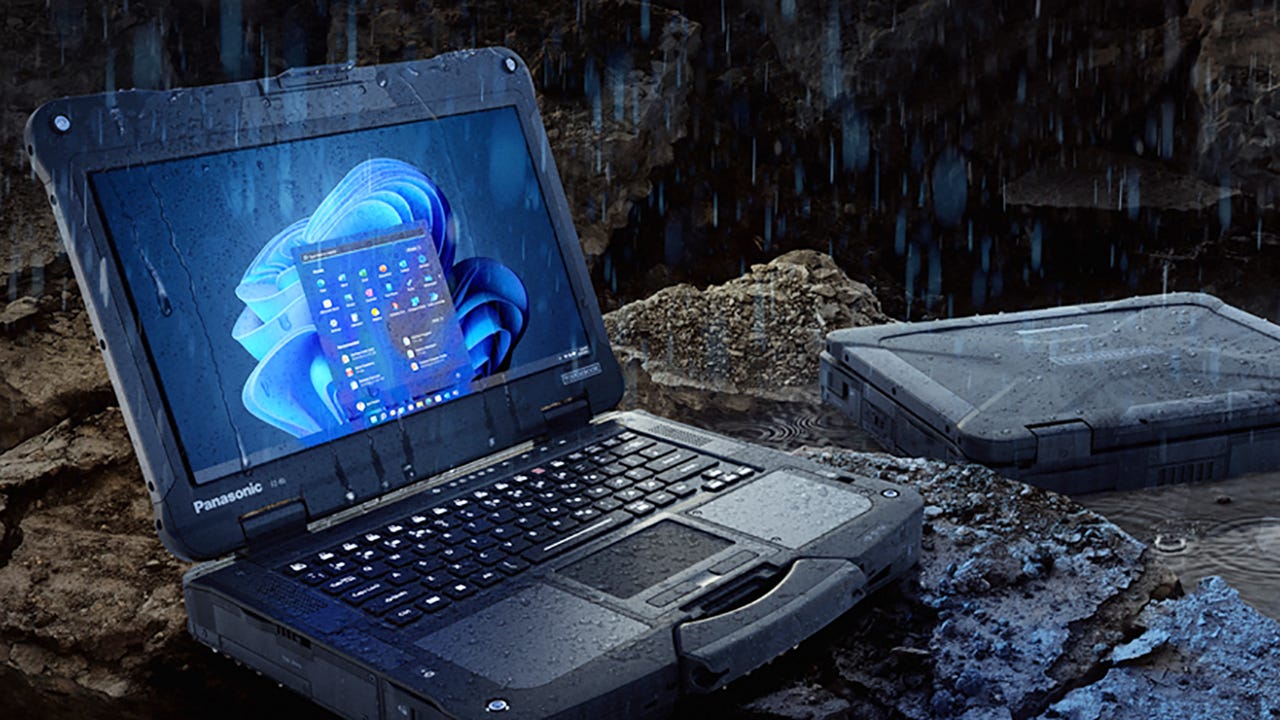































 Image: Panasonic
Image: Panasonic Designed for demanding customers like the military, police and utility companies, Panasonic's new Toughbook 40 -internally dubbed the 'ultimate Toughbook' -brings new levels of modular configurability to the fully rugged laptop space.
Built around a magnesium alloy chassis and carrying the requisite rugged credentials -IP66 rating for dust/water resistance, MIL-STD-810H temperature, humidity and vibration testing, and 1.8m drop tests -the 14-inch Toughbook 40 has a modular clamshell design with no fewer than seven expansion areas that allow for a total of 70 different configurations, Panasonic says.
SEE:The hybrid work divide: Managers think tech is the answer - but staff disagree
As well as the ability to swap out the main battery, RAM and SSD drives, there are four areas -left and right sides, rear and palm-rest -that can accept a variety of options. These include a second SSD and a second battery, an optical drive, a smart card reader, various combinations of ports and a fingerprint reader. If that's not enough, there's a fully featured desktop port replicator available too, along with an ecosystem of accessories including a vehicle mount and a four-bay battery charger. Panasonic claims the Toughbook 40 will last for 18 hours on one battery and double that with two batteries installed.
The 3.35kg Toughbook 40 is a Microsoft Secured-Core PC running Windows 11 Pro on 11th-generation Intel Core i5 or i7 vPro processors with 16GB of RAM (64GB max) and 512GB of quick-release SSD storage (2TB max). Graphics are integrated (Intel UHD or Iris Xe Graphics) and the display is an FHD touch screen with auto-detection of touch mode (pen, finger, gloved or wet hand) and up to 1200 nits brightness for outdoor viewability.
Here's a run-down of the Toughbook 40's specifications:
| OS | Windows 11 Pro 64-bit (Windows 10 Pro 64-bit Downgrade Model optional) |
| CPU | Intel Core i5-1145G7 vPro, Core i7-1185G7 vPro |
| RAM | 16GB - 64GB DDR4 |
| GPU | Intel? UHD Graphics (supports Intel Iris Xe Graphics when 2 RAM modules installed) |
| Storage | 512GB, 1TB, 2TB quick-release NVMe OPAL SSD (with heater) |
| Screen | 14-inch touch LCD, FHD (1920 x 1080 pixels), up to 1.200cd/m2 brightness |
| Front camera | 5MP with IR / privacy shutter (Windows Hello compliant) optional |
| Speakers | Waves MaxxAudio stereo speakers |
| Microphones | 4x mics with Enhanced Voice Recognition |
| LAN | IEEE 802.3 10Base-T / IEEE 802.3u 100BASE-TX / IEEE 802.3ab 1000BASE-T (2nd GLAN optional) |
| Bluetooth | 5.1 Class 1 |
| Wireless LAN | Intel Wi-Fi 6 AX201 |
| Mobile broadband | 4G LTE, 5G support in summer 2022 |
| Global positioning | u-blox NEO-M8J (supports GPS, GLONASS, Beidou, Galileo) |
| Interfaces | 2x USB 3.2 Gen 1 Type-A, Thunderbolt 4, Micro SDXC, HDMI, 3.5mm audio jack, power, port replicator connector, quad path through connector |
| Left expansion area options | 2nd SSD, smart card reader, DVD drive, Blu-ray drive |
| Right expansion area options | 2nd battery, smart card reader |
| Rear expansion area options | VGA + True Serial (RS232) + 2nd native GLAN ? USB 3.1 Type A + True Serial (RS232) + 2nd HDMI ? USB 3.1 Type A + USB 3.1 Type A + 2nd HDMI |
| Palm rest expansion area options | fingerprint reader (Windows Hello), fingerprint reader (Windows Hello, multi-user authentication), contactless smart card reader |
| Security | TPM 2.0, Password security, Integrated hardware security lock slot |
| Power | AC adapter (100V - 240V AC, 50Hz/ 60Hz, Output: 15.6V DC, 7.05A) |
| Battery | Li-ion 10.8V, 6500mAh (typ.), 6300mAh (min.) |
| Battery life | ~18 hours, ~36 hours with 2nd battery |
| Power management | Standby function, ACPI BIOS |
| Dimensions (WxHxD) | 354mm x 301mm x 54.4mm (without protruding parts) |
| Weight | ~3.35kg |
| Drop resistance | 180cm |
| Dust/water resistance | IP66 |
| Operating temperature | -29
|